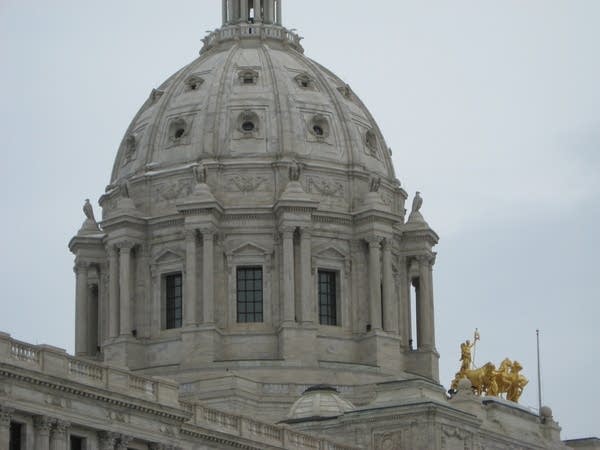Talks resume for session-ending budget deal
Go Deeper.
Create an account or log in to save stories.
Like this?
Thanks for liking this story! We have added it to a list of your favorite stories.

Top legislative Democrats and Gov. Tim Pawlenty headed into a fresh round of budget talks Tuesday with renewed optimism for negotiating an end to the session.
"We're going to try to bring this to a head here today," the Republican governor said on his way to the talks.
DFL House Speaker Margaret Anderson Kelliher suspended debate on an education spending bill after taking a call from Pawlenty at her desk above the House floor. She said he expressed concern about forcing GOP representatives into a tough vote before an overall deal is in place.
Kelliher said she wants to pick up the pace.
Learn how to have civil, political conversations with our e-book Talking Sense
Political debates with family or friends can get heated. But what if there was a way to handle them better?
Download our free e-book, "Talking Sense: Have Hard Political Conversations, Better," and learn how to talk without the tension.
"I felt that yesterday went on far too long in terms of not really making progress and that we would need a deadline today to be able to make some decisions," she said, adding that the deadline would probably be later Tuesday.
With the 2008 session fading fast, a mutually agreeable plan to blunt property tax hikes around the state has proven elusive. It is considered the key ingredient to a broader budget deal and an orderly finish to the election-year session.
Lawmakers spent much of Monday and Tuesday morning waiting on number crunchers to show them how a property tax cap, extra local government aid and more direct-to-homeowner assistance fit together.
Uncertainty revolved around the effect of a property tax cap on local governments, said Senate Taxes Committee Chairman Tom Bakk, DFL-Cook. He said lawmakers must be careful when restricting tax money to cities and counties because public safety is one of their major responsibilities.
Bakk said a tax compromise is still within reach. He said Pawlenty needs to do something about the increase in property taxes during his administration and the state needs the money that would be raised by tightening taxation of companies with foreign operations.
"If the governor really wants one, we'll get there," Bakk said of a compromise.
Pawlenty has been calling the property tax cap the key to a session-ending deal.
The tax talk has occurred as state leaders also try to mend a budget with a projected $935 million shortfall.
Other items awaiting action in the final week - the session must end by May 19 - were a proposal to send more money to schools and a subsidy package for the Mall of America.
The Democrat-controlled House started, then suspended debate on a bill that would send an additional $51 per student to public school districts around the state. Republican Minority Leader Marty Seifert urged Democrats to wait until they get an overall agreement with Pawlenty.
Schools would get the extra money on a one-time basis. The bill also seeks to freeze a Pawlenty-pushed program that gives more money to school districts that adopt performance-pay contracts for teachers.
The Senate approved legislation regulating contracts between surrogate mothers and prospective parents and started debating a proposal to keep Minnesota from going along with a federal plan for enhanced identification requirements.
The Legislature stood ready to authorize the city of Bloomington to raise a menu of sales, lodging and restaurant taxes to help subsidize a $2.1 billion Mall of America expansion. The mall's owners first would have to open their books to prove a need the public dollars.
Pawlenty was due to act Tuesday on a batch of bills the Legislature sent him last week.
Among them are an education policy bill that would raise the high school dropout age from 16 to 18 and make hockey the official state sport. Another bill would let state employees take time off to donate blood.




